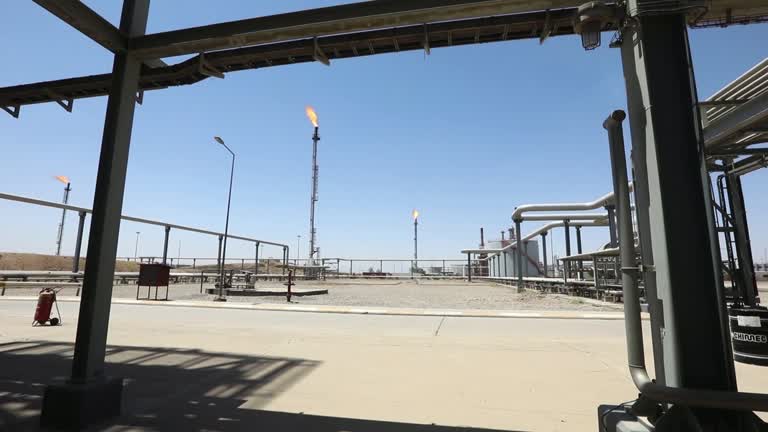By Maha El Dahan, Ahmed Rasheed and Jarrett Renshaw
DUBAI/BAGHDAD/WASHINGTON, Feb 21 (Reuters) – U.S. President Donald Trump’s administration is piling pressure on Iraq to allow Kurdish oil exports to restart or face sanctions alongside Iran, eight sources with direct knowledge of the matter told Reuters.
A speedy resumption of exports from Iraq’s semi-autonomous Kurdistan region would help to offset a potential fall in Iranian oil exports, which Washington has pledged to cut to zero as part of Trump’s “maximum pressure” campaign against Tehran.
The U.S. government has said it wants to isolate Iran from the global economy and eliminate its oil export revenues in order to slow Iran‘s development of a nuclear weapon.
Iraq’s oil minister made a surprise announcement on Monday that exports from Kurdistan would resume next week. That would mark the end of a near two-year dispute that has cut flows of more than 300,000 barrels per day (bpd) of Kurdish oil via Turkey to global markets.
Reuters spoke to eight sources in Baghdad, Washington and Erbil, the capital of Iraqi Kurdistan, who said that mounting pressure from the new U.S. administration was a key driver behind Monday’s announcement.
All of the sources declined to be named due to the sensitivity of the issue.
Iran views its neighbor and ally Iraq as vital for keeping its economy afloat amidst sanctions. But Baghdad, a partner to both the United States and Iran, is wary of being caught in the crosshairs of Trump’s policy to squeeze Tehran, the sources said.
Khamenei Cites Need to Further Develop Iran’s Military After Trump Threats
Trump wants Iraqi Prime Minister Mohammed Shia al-Sudani to sever economic and military ties with Iran. Last week, Reuters reported that Iraq’s central bank blocked five more private banks from dollar access at the request of the U.S. Treasury.
Iraq’s announcement on export resumption was hurried and lacked detail on how it would address technical issues that need to be resolved before flows can restart, four of the eight sources also.
Iran wields considerable military, political and economic influence in Iraq through its powerful Shi’ite militias and the political parties it backs in Baghdad. But the increased U.S. pressure comes at a time when Iran has been weakened by Israel’s attacks on its regional proxies.
CURB SMUGGLING
With the pipeline taking Kurdish crude to the Turkish port of Ceyhan closed since 2023, the smuggling of Kurdish oil to Iran by truck has flourished. The U.S. is urging Baghdad to curb this flow, six of the eight sources said.
Reuters reported in July that an estimated 200,000 barrels per day of cut-price crude was being smuggled from Kurdistan to Iran and, to a lesser extent, Turkey by truck. The sources said the exports remained at around that level.
“Washington is pressuring Baghdad to ensure Kurdish crude is exported to global markets through Turkey rather than being sold cheaply to Iran,” said an Iraqi oil official with knowledge of the crude trucking shipments crossing to Iran.
Fuel Oil Smuggling Network Rakes in $1 Billion for Iran and Its Proxies
While the closure of the Turkish pipeline has prompted an uptick in Kurdish oil smuggling via Iran, a larger network that some experts believe generates at least $1 billion a year for Iran and its proxies has flourished in Iraq since al-Sudani took office in 2022, Reuters reported last year.
Two U.S. administration officials confirmed the U.S. had asked the Iraqi government to resume Kurdish exports. One of them said the move would help to dampen upward pressure on oil prices.
Asked about the administration’s pressuring of Iraq to open up Kurdish oil exports, a White House official said: “It’s not only important for regional security that our Kurdish partners be allowed to export their own oil but also help keep the price of gas low.”
There has been close military cooperation between authorities in Kurdistan and the United States in the fight against Islamic State.
Trump’s restoration of the “maximum pressure” campaign on Iran was one of his first acts after returning to office in late January. In addition to efforts to drive Iran‘s oil exports to zero, Trump ordered the U.S. treasury secretary to ensure that Iran can’t use Iraq’s financial system.
Trump also came into office promising to lower energy costs for Americans. A sharp drop in oil exports from Iran could drive up oil prices, and with it the gasoline price worldwide.
The resumption of Kurdish exports would help offset some of the loss to global supply of lower Iranian exports, but would cover only a fraction of the more than 2 million bpd of crude and fuel that Iran ships. However, Iran has proven adept in the past at finding means to circumvent U.S. sanctions on its oil sales.
Ole Hansen, head of commodity strategy at Saxo Bank, said the restart of exports from Kurdistan could help increase global oil supplies at a time when output was disrupted from other regions, such as Kazakhstan, where exports have dropped this week following a Ukrainian drone attack on a major pipeline pumping station in southern Russia.
“At this point in time, I believe the market has adopted a relatively neutral but nervous stance on crude oil prices,” he said.
HURDLES TO RESTART
The pipeline was halted by Turkey in March 2023 after the International Chamber of Commerce (ICC) ordered Ankara to pay Baghdad $1.5 billion in damages for unauthorized exports between 2014 and 2018.
There are still unresolved issues around payment, pricing and maintenance, the sources told Reuters. Two days of talks in the Kurdish city of Erbil this week failed to reach agreement, sources said.
The federal government wanted exports to restart without making commitments to the KRG on payments and without clarity on the payment mechanism, a source familiar with the matter said.
“We can’t do that. We need clear visibility on guarantees,” the source said.
Oil companies working in Kurdistan also have questions over payments.
Executives from Norwegian firm DNO DNO.OL told analysts on Feb. 6 that before agreeing to ship oil through the pipeline to Ceyhan they wanted to understand how the company would be paid for future deliveries and how it would recoup $300 million for the oil it had delivered before the pipeline was shut.
Turkey has yet to receive any information from Iraq on the resumption of flows, Turkish Energy Minister Alparslan Bayraktar told Reuters on Wednesday.
A restart could also cause issues in OPEC+, or the Organization of the Petroleum Exporting Countries plus Russia and other allies, where Iraq has been under pressure to comply with its pledge to reduce its output. Additional supply from the Kurdish region could put Iraq over its OPEC+ supply target.
An Iraqi official said it was possible for Iraq to restart the pipeline and remain compliant with OPEC+ supply policy.
Giovanni Staunovo, a commodity analyst at investment bank UBS, said the overall impact of the resumption could be muted.
“From an oil market perspective, Iraq is bound to the OPEC+ production deal, so I wouldn’t expect additional production from Iraq in case of a pipeline restart, but just a change in the way it is exported (currently, among others, using trucks),” he said.
(Reporting by Ahmed Rasheed, Maha El Dahan, Jarrett Renshaw, Alex Lawler, Anna Hirtenstein and Nerijus Adomaitis; writing by Alex Lawler; editing by Simon Webb and Daniel Flynn)














